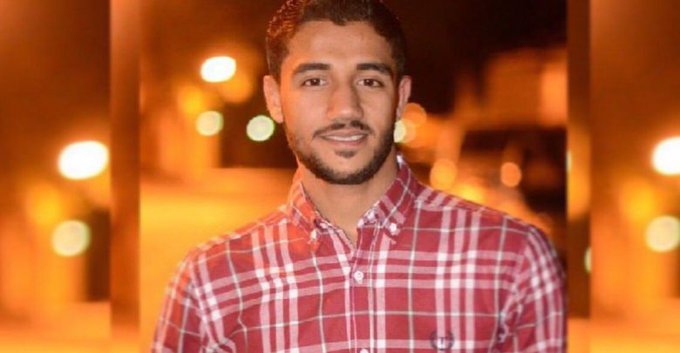Sayed Kadhem Ali was a former political prisoner, who tragically died from terminal cancer following egregious medical negligence during his detention in Jau Prison between 2015 and 2018. Sayed suffered from a tumor in his brain and despite numerous calls to provide sufficient medical treatment, one of which directly written by UN experts to state “Grave Concern”, and several complaints from Sayed’s family to the Ministry of Interior Ombudsman, Sayed died on 3 February 2020. Hundreds of people gathered in the streets of Bahrain to mourn his loss.
In May 2018, Sayed’s family filed a complaint to Jau Prison and to the Ministry of Interior Ombudsman requesting medical aid for the symptoms that their son was suffering from. This complaint was held when Sayed was unable to attend his court hearing in April 2018. The letter stated that Sayed had brain cancer, yet neither Jau Prison nor the MoI Ombudsman took the message seriously.
On 22 June 2018, Sayed fell unconscious in the prison and was rushed to the Bahrain Defence Force Hospital. He then underwent an MRI to confirm his condition. As Sayed’s family stated in the letter, he was diagnosed with a brain tumor and, as a result, an urgent surgery was performed. The surgery was carried out on Saturday 23 June and a tube was placed to drain fluid from his head in order to relieve pressure on his brain. Sayed’s family were contacted by Jau Prison who informed them that Sayed was at the Bahrain Defence Force Hospital. When Sayed’s brother tried to visit him, he was only told that Sayed was in the surgery room, which had not previously been made clear. The doctor explained to him that Sayed suffered from a brain tumor and needed urgent surgery to place a tube in his head. The doctor also told Sayed’s brother that Sayed would need a tube replacement in about a week. His brother was prevented from visiting him until he got a visit approval on 25 June, and was not able to get another visit thereafter.
On 30 June 2018, Sayed was readmitted to the surgery room in order to change his tube. Sayed’s parents had no choice but to agree and were prevented from seeing Sayed’s medical reports or his X-rays. They were also unable to receive a second opinion about their son’s medical issue. The hospital explained that because Sayed was a prisoner, the Jau Prison administration did not allow them to release the reports. On 2 July 2018, a date was set for the tumor removal.
Both of the complaints filed by the family to MoI Ombudsman and Jau Prison, in late May and mid-June 2018, clearly referred to Sayed’s tumor and the lack of treatment by Jau Prison. However, Sayed was not sent to a clinic, and his family did not receive any answer from the MoI that they were reviewing the case with Jau Prison. On 24 June, after Sayed was transferred to the Bahraini Defence Force Hospital, his family filed another complaint to the MoI Ombudsman and the National Institution for Human Rights. The complaint stated the negligence of the medical staff concerning the prison’s administration.
After the surgery on 2 July, Sayed’s parents went to the hospital to visit him. His vision was deeply affected and Sayed was unable to distinguish people. Sayed had a lot of symptoms such as strong headaches, weak vision, vomiting and infection; he stated that most of these symptoms disappeared following the surgery, except for his vision. Sayed also suffered from amnesia, lack of focus, and severe back pain, which his doctor considered to be usual symptoms of the tumor. The doctor also told Sayed’s family that he was unable to determine the type of tumor (benign or malignant-cancerous) until it was removed.
The surgery to remove the tumor was performed on 2 July and lasted five hours. His vision was not completely clear due to Jau Prison’s delay in sending him to the hospital. The doctor removed the tumor, but was not sure that he could eradicate it completely. While Sayed’s condition improved slightly, his doctor decided to conduct an MRI to check if part of the tumor could be removed in the process. From then on, Sayed needed to be admitted once a week to the surgery room in order to change the tube in his head. The doctor did not know if his vision would come back.
Systemic denial of medical care in Bahrain’s prison must end, as every prisoner has the right to sufficient medical treatment. Bahrain’s authorities actions are in violation of international law obligations, including the Convention against Torture and Other Forms of Cruel, Inhuman or Degrading Treatment or Punishment (CAT), Articles 5, 6, 7, 9, 10, 14 and 18 of the International Convenant on Civil and Political Rights (ICCPR) and Article 12 of the International Convention on Economic, Social and Cultural Rights (ICESCR). Bahrain is a party to each of these treaties.
Americans for Democracy & Human Rights in Bahrain (ADHRB) calls on the government to open an investigation into the people responsible for the denial of medical care to Sayed, with the view to holding the perpetrators accountable. Additionally, ADHRB calls on the Bahraini Government to put an end to the systemic denial of medical care, and to provide sufficient medical treatment to all prisoners in respect of their human rights.





